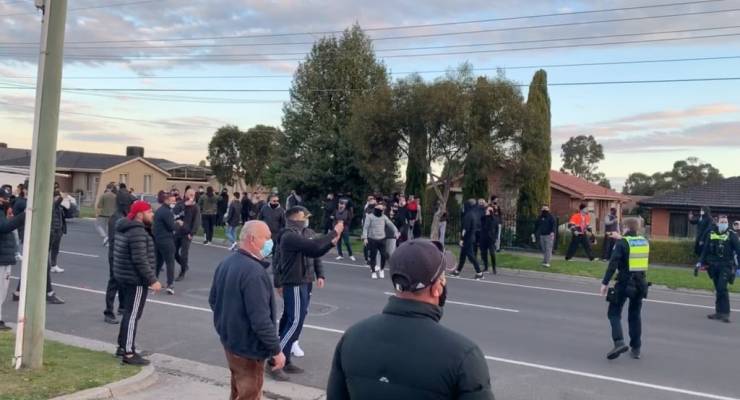
Anti-lockdown protesters rally
Hundreds of people protested in Dandenong in Melbourne’s south-east yesterday evening, rallying for their “right to freedom” against the state’s stage four COVID-19 restrictions.
Protesters said they didn’t believe the virus was real, with 7News reporting one man was arrested for antagonising and refusing to cooperate with police.
Another man, believed to have organised the rally, was charged with incitement, and another 11 people were fined $1652 for breaching lockdown restrictions.
On the same day more than 600 staff at Frankston Hospital, north-east of Melbourne, were sent into quarantine following a COVID-19 outbreak. Yesterday, 44 Peninsula Health staff had COVID-19.
Of Victorian health workers who’ve been infected, 70 to 80% caught it at work, compared to 22% during the first wave of the pandemic.
This morning Victoria recorded 113 new COVID-19 cases and 23 deaths in the past 24 hours, with Prime Minister Scott Morrison saying this morning’s case numbers were “nowhere near” where they need to be.
COVID-19 susceptibility
A new study has found men produce a weaker immune response to the virus than women, with women’s bodies producing more T cells, which kill virus-infected cells and stop the infection from spreading. The older the men, the weaker their T cell responses.
One theory is women have stronger immune responses to fight pathogens that threaten unborn or newborn children.
Another study has found that a COVID-19 vaccine may not be as effective in obese people. Obese people are 48% more likely to die of the virus than people of a healthy weight, and more than double as likely to require hospitalisation.
While obese people fare worse from the virus, those on blood thinners may have an advantage: of patients hospitalised with COVID-19, those taking anticoagulants were 30% less likely to need a ventilator and were 50% less likely to die from the disease.
Economies keep struggling
Working from home is costing NSW billions. Economists have predicted the pandemic will cost Sydney’s CBD $10 billion in hospitality, arts and retail losses.
The state will take nearly three years to recover from the coronavirus recession, reverting to where it was in 2017-18. Economic setbacks have been worsened by the hard border closure with Victoria, and international border closure.
The state recorded nine new cases this morning, five of which were linked to the new Sydney CBD cluster.
The UK’s economy was the hardest hit among major economies between April and June, new data has revealed. The UK’s economy contracted by 20.4%. The average decline from Organisation for Economic Co-operation and Development countries was 9.8%.
Spain’s economy was the second hardest hit, declining by 18.5%.
Reinfection up, testing down
Cases of reinfection are becoming more common, with two more cases reported in Europe. One person in the Netherlands and person in Belgium tested positive for different strains of the virus they had initially been infected with.
In the US, the Centers for Disease Control and Prevention has softened its COVID-19 testing guidelines, saying people without symptoms — even if they have been in close contact with someone infected with the virus — should not get tested.








Schlock horror, the economy might go back to the Dark Ages of despair, poverty, misery and deprivation.
How did we ever survive those terrible times in 2017/18?
What would we do without economists?
No “reality TV personality” or film star has died of the virus. Until that happens it will always be a hoax.
So few prepared to stand up against the government and its bully boys. No wonder the Soviet Union lasted so long! No wonder there are so many dictators around the world!
Greed, power, and murder are the order of the day.
What “pandemic?” It is a simple matter to ascertain the figures and realise it is all a grab for power. For the numbers are not there for a pandemic no matter how loud the WHO shouts.
Good on the people in Dandenong. We have been ripped off by the usual mob of politicians for the umpteenth time this year…